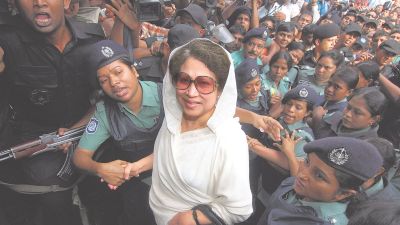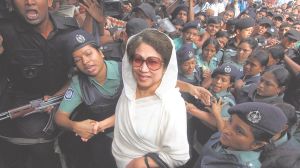Vanishing Moments
FOR three decades till Indira Gandhi8217;s death on the last Wednesday afternoon of October 1984, Usha Bhagat was Mrs G8217;s secretary, c...

FOR three decades till Indira Gandhi8217;s death on the last Wednesday afternoon of October 1984, Usha Bhagat was Mrs G8217;s secretary, confidante, adviser on cultural nuances, saris 8212; her woman Friday. Indiraji, Through My Eyes is a loyal assistant8217;s memoir.
It is not a biography, as Bhagat emphasises in her introduction 8212; 8220;I was neither interested in writing another biography nor accomplished enough to do so8221; 8212; but more an indulgence of memories, a re-reading of old letters, and generous nostalgia.
This book, despite the fact that some of what it contains has already appeared in other publications, is still an easy and fairly informative read. It starts in the 1950s, when Bhagat,the trauma of Partition just behind her, began working for Indira Gandhi.
It speaks of another Delhi, a smaller, more homogenised city where the prime minister and his family were more easily accessible. It speaks of the old India and its elite; indeed it speaks of an India that still had an elite. These days it has Page 3.
Just how tiny was, what used to be called, the Indian middle class is apparent from this paragraph: 8220;My grandfather was a trustee of a woman8217;s college in Lahore and my aunt also used to teach mathematics there. Once my grandfather invited some professors for tea. I remember three of them quiet vividly, because I met them again in Delhi after 1947.8221;
What does this book tell us about Indira Gandhi? Nothing dramatically new, but enough to add to our fund of knowledge. The letters Bhagat reproduces, even if they say little by themselves, indicate a woman growing out of the shadow of 8220;Papu8221;, maturing into, well, empress of India.
In Indira Gandhi8217;s differences with 8220;Aunty Gauba8221; 8212; a German lady running a school in Delhi, who once slapped the prime minister8217;s daughter 8212; Bhagat sees shades of the Indira-Maneka tussle four decades later.
No pretensions, only honest memories8212;this is a fine book to dip into a lazy summer8217;sday; or perhaps even that happy phenomenon vanished with the old Delhi!
- 01
- 02
- 03
- 04
- 05































